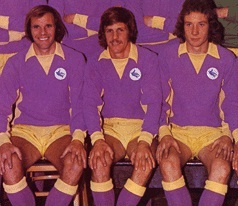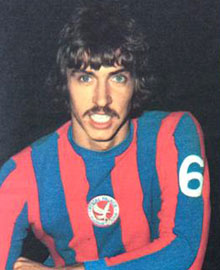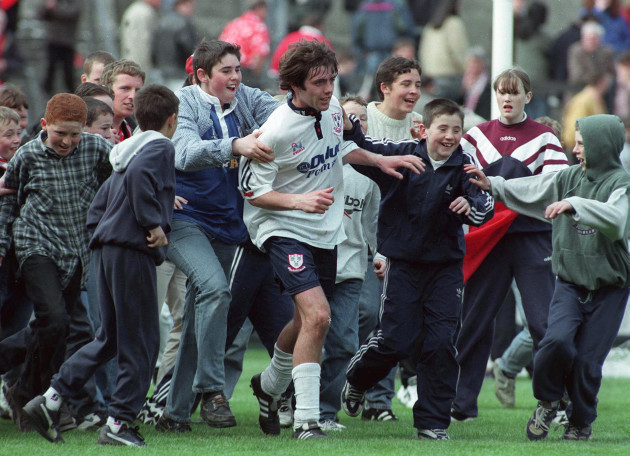First thing to do here is to wish all readers a Merry Christmas, the second thing is to say that I’ll post the answers on Boxing Day morning.
http://mauveandyellowarmy.net/
60’s. What did Peter King ruin in an end of season game aginst Palace a few months before England won the World Cup?
70s. Born in a place called Longsight, the player pictured was in the Palace side for what were, from a City perspective at least, the two most memorable games between the teams in this decade, who is he?
80s. He played for us at Selhurst Park during this decade, but ten years later he was selling burgers on match days outside Ninian Park, before he went on to set up a company which won They’re The Business awards in South Wales a decade ago – who am I describing?
90s. He never played for Palace’s first team, but was an unused sub for them in an FA Cup Semi Final. However, his career was that of a typical lower and non league journeyman except for one moment at the end of this decade which was voted no. 72 in a programme to find the 100 Greatest Sporting Moments, who is he?
00s. The man in the picture left City without playing a game for us, but he was on the bench when we played Palace during this decade. He has been called a “rock and roll footballer” and that seems quite approariate given the name he shares with someone who worked with one of the biggest bands ever in that field, but who is he?
10s. The last Palace squad to play against us featured three Wales internationals, someone who would later play for us and a non Welsh former City player, can you name them all?

Crystal Palace answers
60s. Peter King’s solitary goal decided a City v Palace game at Ninian Park on 30 April 1966. In scoring that goal, King ruined the chances of a fifth consecutive 0-0 draw between the teams dating back to the season when the Football League resumed after the Second World War. In November 1946, Stan Richards got both goals for us in a 2-1 win at Selhurst Park, but nearly 65,000 watched the return match in our Division 3 (South) Championship winning season, the two fixtures in 64/65 and the first match between the sides in 65/66 and didn’t see a single goal.
70s. Derek Jeffries was in the Palace defence for the 1-1 draw at Ninian Park in April 1974 which saw us stay in the old Second Division at their expense and for the match at Selhurst Park in April 1976 when Adrian Alston’s goal was enough to secure a win that went a long towards ensuring that it was us who were promoted from the old Division Three and not Palace.
80s. Wayne Matthews was in the City team beaten 1-0 at Selhurst Park in November 1983. In 1993, he was released by Cwmbran town because they couldn’t afford to keep on paying his wages and so he earned some money on Saturday afternoons by selling food from a refreshment kiosk close to his old team’s ground.
90s. Goalkeeper Jimmy Glass’ career was defined by the goal he scored in the dying seconds of a game between Carlisle (he was on loan to them from Swindon) and Plymouth which secured a 2-1 win and ensured that the Cumbrians retained their Football League place at the end of the 98/99 season.
00s. Tony Sheridan played Premier League football for Coventry under Bobby Gould in the nineties before he hooked up again with the former Wales boss at Cardiff in 2000 and he was an unused sub for a League Cup game against Palace at Ninian Park in September of that year. Tony Sheridan was also the name of a singer songwriter who collaborated with the Beatles in the early 60s, but going back to the footballer, this interesting article makes it clear that he was a player of some ability;-
https://www.the42.ie/tony-sheridan-league-of-ireland-shelbourne-coventry-city-3243598-Feb2017/
10s. Joe Ledley, Wayne Hennessey and Danny Gabbidon were all in the Palace squad, Cameron Jerome was the non Welsh ex City player and Kagisho Dikgacoi was the future City player – someone has since pointed out that there was another future City player that day, Marouane Chamakh, the scorer of Palace’s first goal.


